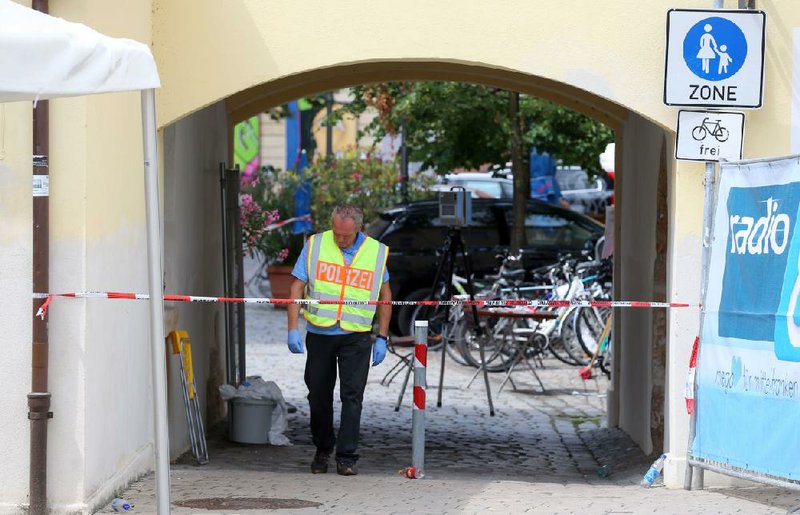ANSBACH, Germany -- A Syrian man who tried unsuccessfully to claim asylum in Germany pledged allegiance to the Islamic State group and vowed the nation's people "won't be able to sleep peacefully anymore" in a cellphone video before blowing himself up outside a wine bar, wounding 15 people, authorities said Monday.
The assailant set off a backpack laden with explosives and shrapnel Sunday night after being refused entry to a crowded music festival in the Bavarian city of Ansbach because he didn't have a ticket.
The device was rigged with metal projectiles normally used in woodworking, according to Elke Schonwald, a Nuremburg police spokesman.
It was the fourth attack to shake Germany in a week, and the second claimed by the Islamic State group. Three of the attacks were carried out by recent immigrants, rekindling concerns about Germany's ability to cope with the estimated 1 million migrants registered entering the country last year, an influx that has since dwindled as the flow of newcomers slowed.
The attack prompted a chorus of voices critical of German Chancellor Angela Merkel's initial decision to welcome refugees and others last year.
Bavarian Interior Minister Joachim Herrmann told reporters at a news conference Monday that in his view the bombing was "an Islamist suicide attack."
"It's horrible that someone who came into our country to find protection carries out such a gruesome deed," he told reporters. "It's probably just due to lucky circumstances in the end that more people haven't died."
Herrmann said a laptop with extremist videos was found at the apartment of the suspect, a 27-year-old Syrian identified only as Mohammad D in line with German privacy laws. A video on his cellphone showed him declaring loyalty to the Islamic State group and announcing a "revenge act against Germans because they are standing in the way of Islam."
The suspect also declared Germans "won't be able to sleep peacefully anymore," Herrmann said. "I think after this video there's no doubt that the attack was a terror attack with an Islamist motivation."
In its claim of responsibility, the extremist group said the attack was carried out by "one of the soldiers of the Islamic State."
The Islamic State-linked Aamaq news agency said the attacker acted in response to the extremist group's call to target countries of the U.S.-led coalition fighting it in Iraq and Syria. Germany is not involved in combat operations but has contributed reconnaissance aircraft to the effort.
After the Islamic State connection surfaced, federal prosecutors in Karlsruhe, who investigate all suspected terrorism, took over the case, saying they would seek to "determine if thus-far unknown accomplices or backers were involved in the crime."
The suspect came to Germany two years ago and applied for asylum in August 2014, Interior Minister Thomas de Maiziere said. It turned out that he had already registered in Bulgaria and later in Austria, so Germany rejected his request and ordered him deported to Bulgaria -- most recently on July 13.
Asylum-seekers are routinely deported to the first country where they registered if they don't follow proper procedures, even if they're considered to have a legitimate asylum claim.
De Maiziere said the man had attempted to take his own life twice before in Germany, and had been in psychiatric care.
A team of 30 investigators was interviewing the man's acquaintances and examining evidence collected from his home.
The U.S. military has a facility in Ansbach, and after the attack it increased security there.
Sunday's attack culminated a week of violent assaults. On July 18, a 17-year-old Afghan asylum-seeker wounded five people with an ax before being killed by police near the Bavarian city of Wuerzburg in an attack that was also claimed by the Islamic State group.
On Friday, the 18-year-old son of Iranian immigrants went on a rampage at a Munich mall, killing nine people and wounding dozens. Authorities say he was undergoing psychiatric treatment and had no known links to terrorism.
And on Sunday, hours before the Ansbach attack, a Syrian man killed a woman with a knife in the southwestern city of Reutlingen before being captured by police in a crime authorities say was not believed linked to terrorism.
"Naturally people are concerned and are questioning whether they should change their routines," de Maiziere said. "We should not. ... We should continue to live our free lives."
Still, he said he had ordered an increased security presence at airports, train stations and elsewhere.
Information for this article was contributed by David Rising, Kirsten Grieshaber, Tomislav Skaro, Frank Jordans, Hakan Kaplan and Bassem Mroue of The Associated Press; and by Anthony Faiola and Stephanie Kirchner of The Washington Post.
A Section on 07/26/2016

